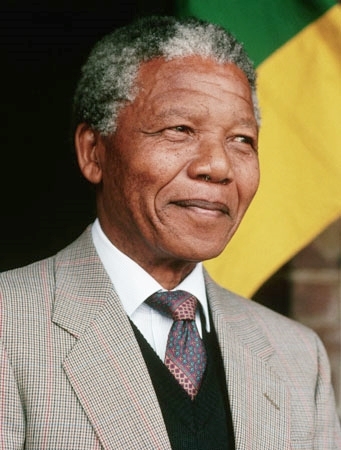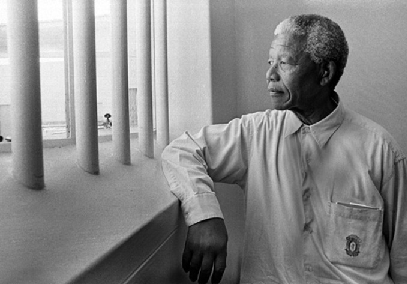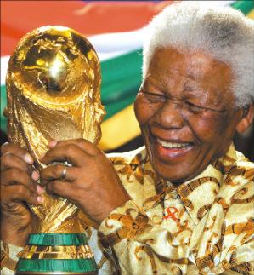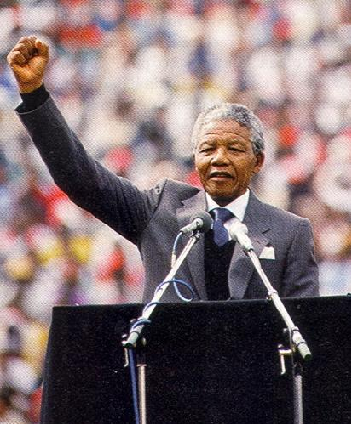 |
| Mandela smiles in front of an ANC flag. (http://www.nelsonmandelaonline.net/) |
"Your majesties, your royal highnesses, distinguished guests, comrades, and friends: Today, all of us do, by our presence here, and by our celebrations in other parts of our country and the world, confer glory and hope to newborn liberty."
On May 12th, 1994, Nelson Mandela opened his inaugural address, titled "Glory and Hope," with these first words. A significant leader to many, he became the first South African president to be elected by democratic election. Mandela's career as a human rights activist began as a teenager when he left the comfort of his tribe to pursue a career in law. After graduating, Mandela fought against the apartheid that plagued his country for many years. He joined and founded protest organizations that fought against the dominating, white government's segregation of the black South Africans. After 55 years of struggle, Mandela won his battle and ended apartheid. He was awarded the Noble Peace Prize for his work in 1993, and the next year, became first president of a united South Africa and an international hero. Nelson Mandela dedicated his life to a courageous battle for the political and social rights of his fellow South Africans; his perseverance, compassion, and sacrifices mark him as a true hero and inspiration to millions around the world.
 |
| Mandela was imprisoned for 27 years. (http://www.betterlivingthroughbeowulf.com/ () ()) |
Nelson Mandela's perseverance pushed him to fight
for what he believed in. His
fight was not easy, but he persisted through the many difficulties he faced. Despite
the dangers of being caught, Mandela continued protesting during apartheid. He
understood he could be severely punished for breaking the law, yet pushed it
aside for the greater need of his people. Even after he was imprisoned at
Robben Island for 27 years, he never stopped fighting (Gale Biography in
Context). Through the many years of harsh work and conditions, he continued
teaching and inspiring many of his fellow prisoners to fight for their freedom.
His "influence" on the other inmates soon grew so large that later he was
ordered to be moved to a higher-security prison (EBSCO Biography Reference
Center). The thick, concrete walls of no prison could contain the power of
Mandela's spirit. His imperishable words and actions fueled his people in their
protest against apartheid. Many years
later, during "Glory and Hope," Mandela reminded his people:
"We
understand it still that there is no easy road to freedom. We know it well that
none of us acting alone can achieve success. We must therefore act together as
a united people, for national reconciliation, for nation building, for the
birth of a new world" (Mandela). After he won his battle to end apartheid,
Mandela did not stop in his work. Instead, he took leadership in aiding South
Africa in its struggle to recover. He understood the importance of unifying
South Africa and preventing what occurred from happening again. He never ceased
in working to improve his country. Ultimately, Mandela's perseverance strengthened
South Africa into a beautiful and independent country.
Mandela sacrificed everything he had in his resilient fight for his people's rights. During his 27-year imprisonment, the government offered Mandela conditional freedom if he swore to discontinue his protests. However, he refused, stating he would only agree if they ended the unfair oppression of the black South Africans (Gale Biography in Context). Mandela demonstrated courage to persevere in a time when hope was running low. He chose to sacrifice his already limited, personal freedom in exchange for the liberation of his people. Later, after he was eventually released from prison, Mandela passionately stated: "During my lifetime I have dedicated myself to this struggle of the African people. I have fought against white domination, and I have fought against black domination. I have cherished the ideal of a democratic and free society in which all persons live together in harmony and with equal opportunities. It is an ideal which I hope to live for and to achieve. But if needs be, it is an ideal for which I am prepared to die" (Mandela). In his statement, Mandela exhibited true selflessness. Rather than taking an easy route back to freedom and giving up a seemingly hopeless fight, Mandela chose to keep taking risks. He knew of the potential consequences for his protests for freedom and ultimately was imprisoned. However, his steadfast focus for his people gave him the strength to risk his freedom and his life. Because of his noble sacrifices for the betterment of South Africa, Mandela is a true hero.
 |
| Mandela won the Nobel Peace Prize in 1993. (http://forevernokia.com/news-center/general-news/n ()) |
Despite
years of fighting against the white South Africans, Nelson Mandela showed
compassion and forgiveness, after apartheid was ended, even to those who had fought
against him. In "Glory and Hope," Mandela spoke of the beautiful future he
envisioned for his new country: "We enter into a covenant that we shall build
the society in which all South Africans, both black and white, will be able to
walk tall, without any fear in their hearts, assured of their inalienable right
to human dignity - a rainbow nation at peace with itself and the world"
(Mandela). Mandela described a country where "both black and white" could
coexist in peace. He began by demonstrating his forgiveness to everybody, regardless
of their past actions. He offered a fresh beginning of hope and beauty. Mandela
worked to help heal the wounds of his new country, promising South Africans
that life would be better, and reassuring the Afrikaners (white South Africans),
of their acceptance. As he promised, Mandela brought much change to South
Africa. During his term in 1994, Mandela became the first president to appoint a
cabinet of both native and white Africans. He cooperated with them throughout
his presidency, showing them respect and understanding (Gale Biography in Context).
By bringing Afrikaners into his cabinet, he showed all white South Africans his
trust and his value in their opinions. He took a risk that caused many to doubt
his leadership, but that he knew, ultimately, would lead to the unity of his
country. Mandela's compassion brought together two races into harmony and friendship.
 |
| Mandela's inaugural address, "Glory and Hope." (http://www.blackpast.org/?q=1993-nelson-mandela-ad ()) |
Throughout
his life, Nelson Mandela led his life with compassion, perseverance, and sacrifice
in battles and in times of peace. Beginning as a young man, Mandela continually
strived to help others. His work marked him as both a powerful enemy and a beloved
leader. Much like the people of South Africa, Nelson Mandela is my hero. Even
through his many struggles, he remained determined, selfless, and inspirational.
He understood the harsh consequences of his battle, yet he continued to fight
for the freedom of others. I will forever admire that what Nelson Mandela strove
for were the imperishable trophies; they were the treasure of knowing that he brought
others happiness and peace.
On March 12th, 1994, Nelson Mandela left his country with these words, "The sun shall never set on so glorious a human achievement! Let freedom reign. God bless Africa!" (Mandela).
Works Cited
"Nelson Mandela." Contemporary Black Biography. Vol. 77. Detroit: Gale, 2010. Gale Biography In Context. Web. 11 Dec.
2012.
"Nelson
Mandela." Nelson Mandela (Biography Today) (2010): 1. Biography Reference Center.
Web. 11 Dec. 2012.
Mandela, Nelson. "Glory &
Hope." The Language of Literature: [Grade 9]. Evanston, IL:
McDougal Littell, 2002. 445-47. Print.
Mandela, Nelson. "Speeches." Nelson Mandela`s Statement from the Dock at the Rivonia Trial. African National Congress,
2011. Web. 11 Dec.
2012.
Page created on 1/11/2013 12:00:00 AM
Last edited 1/11/2013 12:00:00 AM
